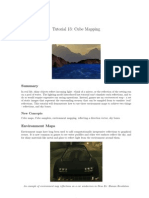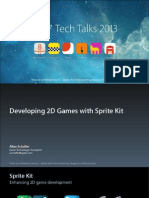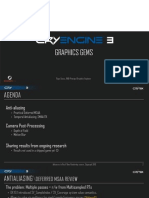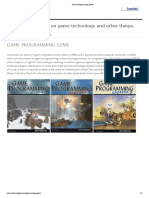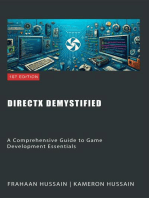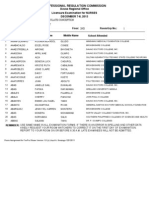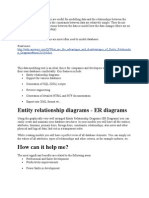C++ For Game Programmers
C++ For Game Programmers
Uploaded by
dharmasaputraCopyright:
Available Formats
C++ For Game Programmers
C++ For Game Programmers
Uploaded by
dharmasaputraOriginal Title
Copyright
Available Formats
Share this document
Did you find this document useful?
Is this content inappropriate?
Copyright:
Available Formats
C++ For Game Programmers
C++ For Game Programmers
Uploaded by
dharmasaputraCopyright:
Available Formats
C++ for Game Programmers
Course Description
C++ has become one of the favourite programming language for game programmers. Reasons for wide spread acceptability of C++ are plenty, but primary reasons are, that it allows programmers to better manage program complexity without loosing performance. C++ popularity will only grow further in the coming years with games increasing in complexity and size. Having a good command over C++ is essential to anyone planning a career in game or graphics programming. It is to fulfil this objective that we have designed this course. Focus in this course will be to get programmers started with and then eventually gain a firm grounding in C++ with a focus on game and graphics programming. The course would be highly interactive with lots of example code and programming exercises to give the student a hands on experience. The course is divided in 2 Parts, Part I will deal with basic and intermediate C++ programming, Part II will cover more advanced C++ topics and windows programming. Part II will also cover game programming fundamentals and finally a complete 2D game will be developed using the knowledge in the previous topics. Code portability will not be covered as a separate topic, however tips will be given on how to keep code portable.
Platform and Tools
We will be using Windows platform for this course. Microsoft Visual Studio 2008 edition will be used for programming during the course. All example code also is based on MS Visual studio 2008. Paint.Net will be used to create and edit graphics for the game. The same will be provided to the student. It is an open source project and executable can be downloaded for free.
Prerequisites
This course should be the first stepping stone in the journey to be a master game programmer. Prerequisites are as follows: Knowledge of computer programming (any computer language) is required. The student should be familiar with editing and compiling source code. Knowing how to use Microsoft Visual Studio will be helpful.
PART I 1. Comparison of C & C++
2. Getting Started with Visual Studio C++. How to create a C++ project Introduction to Visual Studio C++ compiler Visual Studio C++ settings
3. Hello World in C++ Your first C++ program. Hello World explained Basic program structure Pre-processor Directives Declaration and Definition
4. Variables & Constants Fundamental Data types Naming Variable Scope Initialization Constants
5. Pointers and References Pointer basics De-referencing Pointers Using pointers to pass data to functions Using pointers to return multiple values from functions Pointer arithmetic Function Pointers Reference basics Constant References Passing references to functions Returning references from functions
6. Arrays and Structures Defining and Initializing Arrays Passing arrays to functions Multidimensional Arrays Defining and Initializing Structures Practical use of structures
7. Expressions Arithmetic Operators Logical Operators Relational Operators Bit-wise Operators Arrow Operator sizeof Operator
8. Program Flow Decision making if, switch, conditional operator Loops for, while, do-while statements Goto statement
9. Functions Variable scope User defined functions Default Arguments Function Overloading Friend functions Inline functions Math functions
10. Classes Class declaration Access specifiers Object and References Object on heap Constructors and Destructors Separating Interface from Implementation Objects and References Array of Objects Static members of class this pointer Const objects and const class members
Nested classes
11. Basic Memory Management Heap vs stack Object Construction & Destruction Copy constructor Operators new and delete Temporary Objects Pass by value and reference Returning objects, object references and object pointers
12. Operator Overloading Operator Function Operators that cannot be overloaded Overloading Unary Operators Overloading Binary Operators Interpreting Operator function call Assignment Operator Implicit and Explicit Overloading mechanism Overloading new and delete operators
13. Object Oriented Programming Inheritance Is A relationship Single vs Multiple inheritance Inheritance in private, protected and public mode Constructors and destructors in derived class
Polymorphism Compile time vs Runtime Polymorphism Function/method overriding Base class pointers and derived class objects Virtual functions Virtual inheritance Virtual destructors
Why are there no virtual constructors?
Developing a class hierarchy framework Interface based programming Abstract class Pure virtual functions Defining an interface Implementing an interface
Developing a plugin framework
14. File I/O Streams Text File I/O Binary File I/O
15. Templates Basics Function Templates Class Templates Non-Type template parameters Tricky basics Specialization
16. Errors & Exception Handling Error Codes Exception handling fundamentals ASSERT
17. Standard Template Library (STL) Containers and Algorithms Introduction to STL Linked Lists Stacks Queues Maps Algorithms
PART II 18. Run Time Type Identification (RTTI) Runtime Polymorphism & RTTI Typeid & type_info RTTI framework Casting operators
19. Effective C++ usage and Performance Optimization Dealing with large projects Smart Pointers Object Creation and Management Inline functions Preventing excessive object copies
20. Object Serialization
21. Windows programming Introduction to windows programming Introduction to windows mensu, dialogs etc. Programming windows DLLs(Synamic Linked Libraries) Multi-threading
22. Introduction to GDI (Graphic Device Interface) Drawing basic graphics Drawing Images Animation
23. User interaction programming
Keyboard Mouse Joystick
24. Basic Audio programming Creating a basic audio framework
25. Game Programming basics Developing a basic game framework Adding user interactivity Building the game options Adding sound support to the game Adding basic AI into the game
26. Programming your first 2D game
You might also like
- Game Engines Assignment 1Document6 pagesGame Engines Assignment 1api-314623232No ratings yet
- Mansion of Doom GDD V1.0Document8 pagesMansion of Doom GDD V1.0Karen KarentoNo ratings yet
- Beginning C - Through Game Prog - Michael DawsonDocument11 pagesBeginning C - Through Game Prog - Michael DawsonEdwin BerriosNo ratings yet
- GodotDocument1,701 pagesGodotRakshak Awasthi100% (1)
- Questions For HireVue InterviewsDocument2 pagesQuestions For HireVue InterviewsmarkNo ratings yet
- Creating Textures For Games Part-1Document11 pagesCreating Textures For Games Part-1Ciprian PopescuNo ratings yet
- 15 Tutorial 13 - Cube MappingDocument14 pages15 Tutorial 13 - Cube MappingImran HaroonNo ratings yet
- Research Advances Toward Real-Time Path Tracing GTC 2022Document90 pagesResearch Advances Toward Real-Time Path Tracing GTC 2022Niewidzialny TemplariuszNo ratings yet
- Project SynopsisDocument9 pagesProject Synopsisshruti raiNo ratings yet
- Continuous WorldDocument57 pagesContinuous Worldklik11No ratings yet
- Developing 2D Games With Sprite KitDocument50 pagesDeveloping 2D Games With Sprite Kitevenciomendes1861No ratings yet
- Simplexity: Apprenticeship Pitch at The Beginning of The SemesterDocument9 pagesSimplexity: Apprenticeship Pitch at The Beginning of The SemesterNoelia Valderrama BhraunxsNo ratings yet
- 3D Real-Time-Strategy (RTS) Game Tutorial - Unity3D - Coffee Break CodesDocument5 pages3D Real-Time-Strategy (RTS) Game Tutorial - Unity3D - Coffee Break CodesElton Faria BastosNo ratings yet
- Research and Development On Ultimate HoopsDocument5 pagesResearch and Development On Ultimate HoopsSEP-PublisherNo ratings yet
- Lecture 3: Animation & GraphicsDocument32 pagesLecture 3: Animation & GraphicsIyesusgetanewNo ratings yet
- SIGGRAPH 2011 PixelJunk Shooter 2 NotesDocument78 pagesSIGGRAPH 2011 PixelJunk Shooter 2 Notesokonomi_801xNo ratings yet
- Mastering Unity: Advanced Techniques for Interactive Design: Unity Game Development SeriesFrom EverandMastering Unity: Advanced Techniques for Interactive Design: Unity Game Development SeriesNo ratings yet
- Tutorial 25 - SkyBoxDocument10 pagesTutorial 25 - SkyBoxElmerNo ratings yet
- Introduccion CUDA CDocument51 pagesIntroduccion CUDA CEric LilloNo ratings yet
- Iphone Game Development Good Books:: Jeremy AlessiDocument2 pagesIphone Game Development Good Books:: Jeremy AlessiMitulGNo ratings yet
- Computer Graphics - OpenglDocument150 pagesComputer Graphics - Openglapoorvs75No ratings yet
- Graphics Programming in CDocument13 pagesGraphics Programming in Ckrishnaheet100% (1)
- Unity Script Basics For NoobsDocument107 pagesUnity Script Basics For NoobsDaniel Hernán Vargas100% (2)
- A Tutorial On Algol 68Document67 pagesA Tutorial On Algol 68DarthShrineNo ratings yet
- Sousa Graphics Gems CryENGINE3Document59 pagesSousa Graphics Gems CryENGINE3Rodrigo Medeiros LehnemannNo ratings yet
- Unity Lander 1 - Serious GamesDocument48 pagesUnity Lander 1 - Serious GamesGeraldine Claros RiosNo ratings yet
- OpenGL Game Programming TutoriaDocument621 pagesOpenGL Game Programming TutoriaBasavaraj Garag50% (2)
- XNA Isometric Games by Martin ActorDocument13 pagesXNA Isometric Games by Martin ActorGilberto Vecchi MacedoNo ratings yet
- Core HTML5 2D Game Programming - David Geary 9780133564242Document78 pagesCore HTML5 2D Game Programming - David Geary 9780133564242Emiliano VegaNo ratings yet
- Introductions and Tutorials With DirectX 9Document393 pagesIntroductions and Tutorials With DirectX 9RayTracer57No ratings yet
- Optimization For UnityDocument20 pagesOptimization For UnityVenkat PoluNo ratings yet
- Programming Windows With MFCDocument12 pagesProgramming Windows With MFCpaultanasescuNo ratings yet
- How To Create A Homing Missile Using Blueprints in Unreal Engine 4Document23 pagesHow To Create A Homing Missile Using Blueprints in Unreal Engine 4Sherri GibsonNo ratings yet
- Generative Mesh ModelingDocument303 pagesGenerative Mesh ModelingcduretNo ratings yet
- Game Programming Gems - SummaryDocument4 pagesGame Programming Gems - SummaryAbhay BahetiNo ratings yet
- Boids - Modeling and Understanding Emergent BehaviorDocument15 pagesBoids - Modeling and Understanding Emergent Behaviorstudsudzzz100% (1)
- Fractals: Siva Sankari, Sathya Meena, Aarthi, Ashok Kumar, Seetharaman Mohamad Habibur RahmanDocument31 pagesFractals: Siva Sankari, Sathya Meena, Aarthi, Ashok Kumar, Seetharaman Mohamad Habibur RahmanManimegalai PrasannaNo ratings yet
- Dependency Injection With UnityDocument142 pagesDependency Injection With Unitycervantesjc100% (1)
- Table of Contents - Best of Game Programming GemsDocument5 pagesTable of Contents - Best of Game Programming GemsAbhay BahetiNo ratings yet
- Emulated X68000 Development Workstation SetupDocument12 pagesEmulated X68000 Development Workstation SetupL337 H4x0rNo ratings yet
- Slides Chapter 1 Mathematical PreliminariesDocument19 pagesSlides Chapter 1 Mathematical Preliminarieskkhemmo100% (2)
- DirectX TutorialDocument128 pagesDirectX Tutorialsilly_rabbitzNo ratings yet
- DirectX Demystified: A Comprehensive Guide to Game Development EssentialsFrom EverandDirectX Demystified: A Comprehensive Guide to Game Development EssentialsNo ratings yet
- RenderMan For Everyone: SIGGRAPH 2006 Course NotesDocument42 pagesRenderMan For Everyone: SIGGRAPH 2006 Course Notessatychary100% (4)
- Course28-Advanced Real-Time Rendering in 3D Graphics and Games SIGGRAPH07Document144 pagesCourse28-Advanced Real-Time Rendering in 3D Graphics and Games SIGGRAPH07Wagner de SouzaNo ratings yet
- XNA Tutorial 1 - MergedDocument478 pagesXNA Tutorial 1 - MergedNiño Francisco AlamoNo ratings yet
- PascalGamerMagazine Issue03Document56 pagesPascalGamerMagazine Issue03a7410No ratings yet
- Vulkan in C++ (By Nvidia)Document32 pagesVulkan in C++ (By Nvidia)atom tuxNo ratings yet
- High Performance Game Programming in C++Document41 pagesHigh Performance Game Programming in C++OmarMagadanNo ratings yet
- 3D Games DesignDocument10 pages3D Games DesignswoneraNo ratings yet
- Tutorial Unreal Engine 4 para ArquiteturaDocument18 pagesTutorial Unreal Engine 4 para ArquiteturaAlex FernandoNo ratings yet
- Advanced MFC ProgrammingDocument530 pagesAdvanced MFC ProgrammingAndriesNo ratings yet
- Practical Shader Development: Vertex and Fragment Shaders for Game DevelopersFrom EverandPractical Shader Development: Vertex and Fragment Shaders for Game DevelopersNo ratings yet
- Unity Pro Series: Engineering Cutting-Edge Game Mechanics: Unity Game Development SeriesFrom EverandUnity Pro Series: Engineering Cutting-Edge Game Mechanics: Unity Game Development SeriesNo ratings yet
- Python for Machine Learning: From Fundamentals to Real-World ApplicationsFrom EverandPython for Machine Learning: From Fundamentals to Real-World ApplicationsNo ratings yet
- December 2013 NLE Room Assignments - Davao CityDocument150 pagesDecember 2013 NLE Room Assignments - Davao CityjamieboyRNNo ratings yet
- Tactical Games Lesson PlanDocument13 pagesTactical Games Lesson Planapi-349757276No ratings yet
- A Level EconomicDocument7 pagesA Level EconomiccreaterveenNo ratings yet
- AstmDocument18 pagesAstmar_kedarNo ratings yet
- Advances in QRS Detection: Modified Wavelet Energy Gradient MethodDocument7 pagesAdvances in QRS Detection: Modified Wavelet Energy Gradient MethodInternational Journal of Emerging Trends in Signal Processing (IJETSP)No ratings yet
- Rates of Special Admission Charges (Undergraduate) : Seats For The Session 2009-2010Document4 pagesRates of Special Admission Charges (Undergraduate) : Seats For The Session 2009-2010Muhammad Zaheer AnwarNo ratings yet
- Las Tle Smaw q3-w7-9Document11 pagesLas Tle Smaw q3-w7-9Daryl TesoroNo ratings yet
- 2012 GSI Roads Conference Paper 3 Piled Embankments by Wyatt OrsmondDocument49 pages2012 GSI Roads Conference Paper 3 Piled Embankments by Wyatt OrsmondvirajNo ratings yet
- Resume 1 Page RamDocument1 pageResume 1 Page RamRamnarayan ShreyasNo ratings yet
- Etienne Balibar PDFDocument2 pagesEtienne Balibar PDFFhalinaNo ratings yet
- PFE Minimailer 3 Operating ManualDocument36 pagesPFE Minimailer 3 Operating Manualgculliss100% (2)
- Reallusion IClone Pro 6.51.3127Document7 pagesReallusion IClone Pro 6.51.3127AgustinZavaletaNo ratings yet
- Entity Relationship Diagrams - Er Diagrams: P - Diagrams#Ixzz1ZiuysshaDocument5 pagesEntity Relationship Diagrams - Er Diagrams: P - Diagrams#Ixzz1ZiuysshaPrableen SinghNo ratings yet
- 15 Dynamic ProgrammingDocument27 pages15 Dynamic ProgrammingnehruNo ratings yet
- Title "Project Management at Siemens and Risk Management of Associated Projects" ObjectiveDocument2 pagesTitle "Project Management at Siemens and Risk Management of Associated Projects" ObjectiveRaman KapoorNo ratings yet
- Performance Analysis of A Batch Production System With Limited #ExibilityDocument10 pagesPerformance Analysis of A Batch Production System With Limited #Exibilityranjan349No ratings yet
- OPSC OCS Prelims 2006-2020 Questions PDFDocument7 pagesOPSC OCS Prelims 2006-2020 Questions PDFkhandaibhaiviratNo ratings yet
- Stand RdsDocument23 pagesStand RdswentropremNo ratings yet
- Edelman Public RelationsDocument26 pagesEdelman Public RelationsKim SmithNo ratings yet
- Sales Management Course Panda Sachdev 2259Document1,408 pagesSales Management Course Panda Sachdev 2259raachyeta_sharmaNo ratings yet
- p0069 Autlander 2005Document12 pagesp0069 Autlander 2005ricardo romeroNo ratings yet
- How To Use 2 HDMI To RF QAM and IPTV Digital ModulatorDocument38 pagesHow To Use 2 HDMI To RF QAM and IPTV Digital ModulatorthorbroadcastNo ratings yet
- 3360605Document8 pages3360605Civil HodNo ratings yet
- 160181 - الدكتوراه ب تقنيات التعليم نهائيDocument4 pages160181 - الدكتوراه ب تقنيات التعليم نهائيNev Iemand DwalenNo ratings yet
- MCCIN Candidate Application FormDocument3 pagesMCCIN Candidate Application FormRamyaNo ratings yet
- WeDo2.0 Block ProgrammingDocument2 pagesWeDo2.0 Block ProgrammingMihai MoglanNo ratings yet
- Meeting Minutes: (Note: Sample Only)Document3 pagesMeeting Minutes: (Note: Sample Only)muhamad agusNo ratings yet
- DP-50 BrochureDocument2 pagesDP-50 Brochureiwan saputro100% (1)
- Introduction To Vlsi DesignDocument101 pagesIntroduction To Vlsi DesignfsdffcdsfvNo ratings yet






